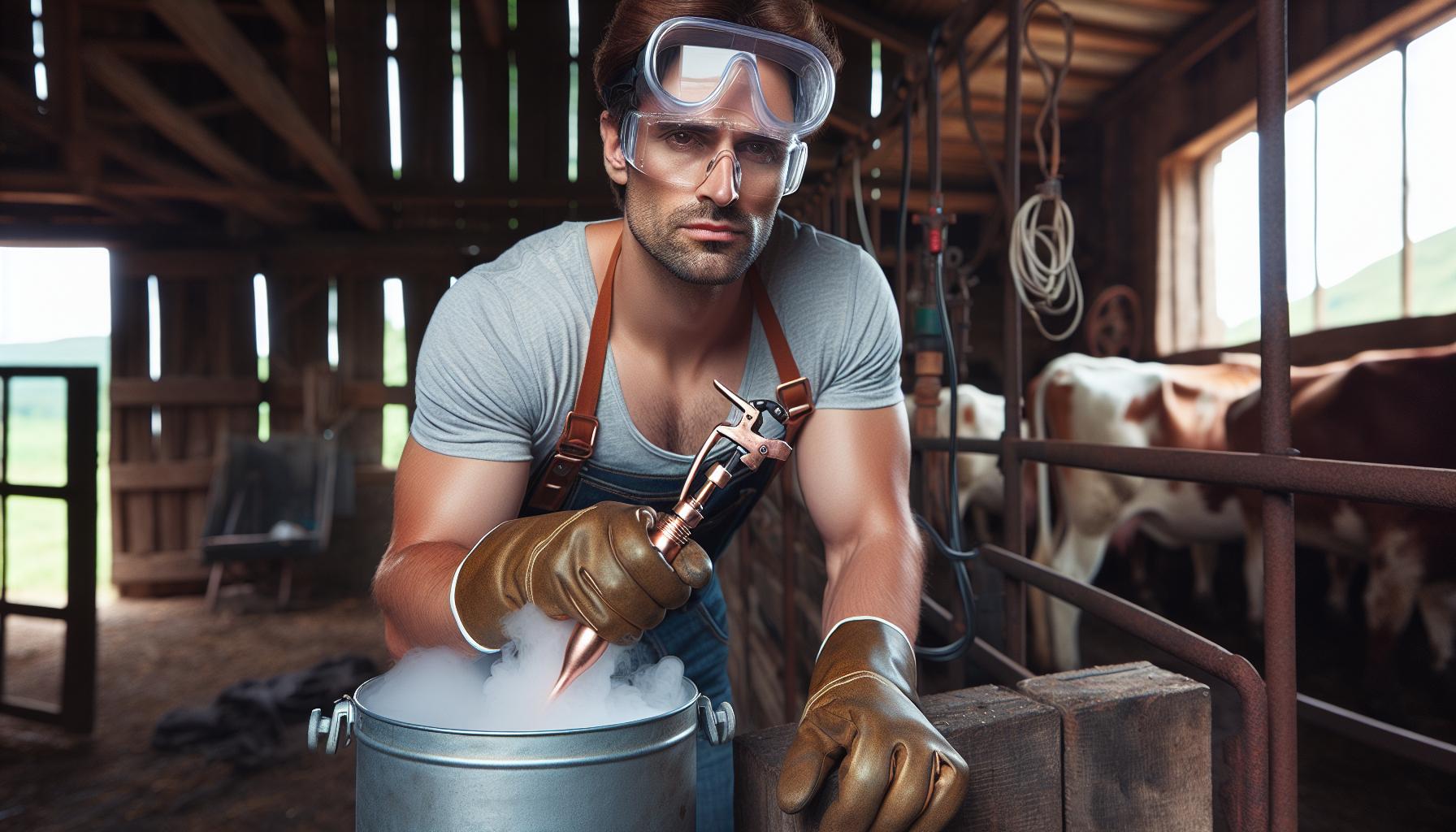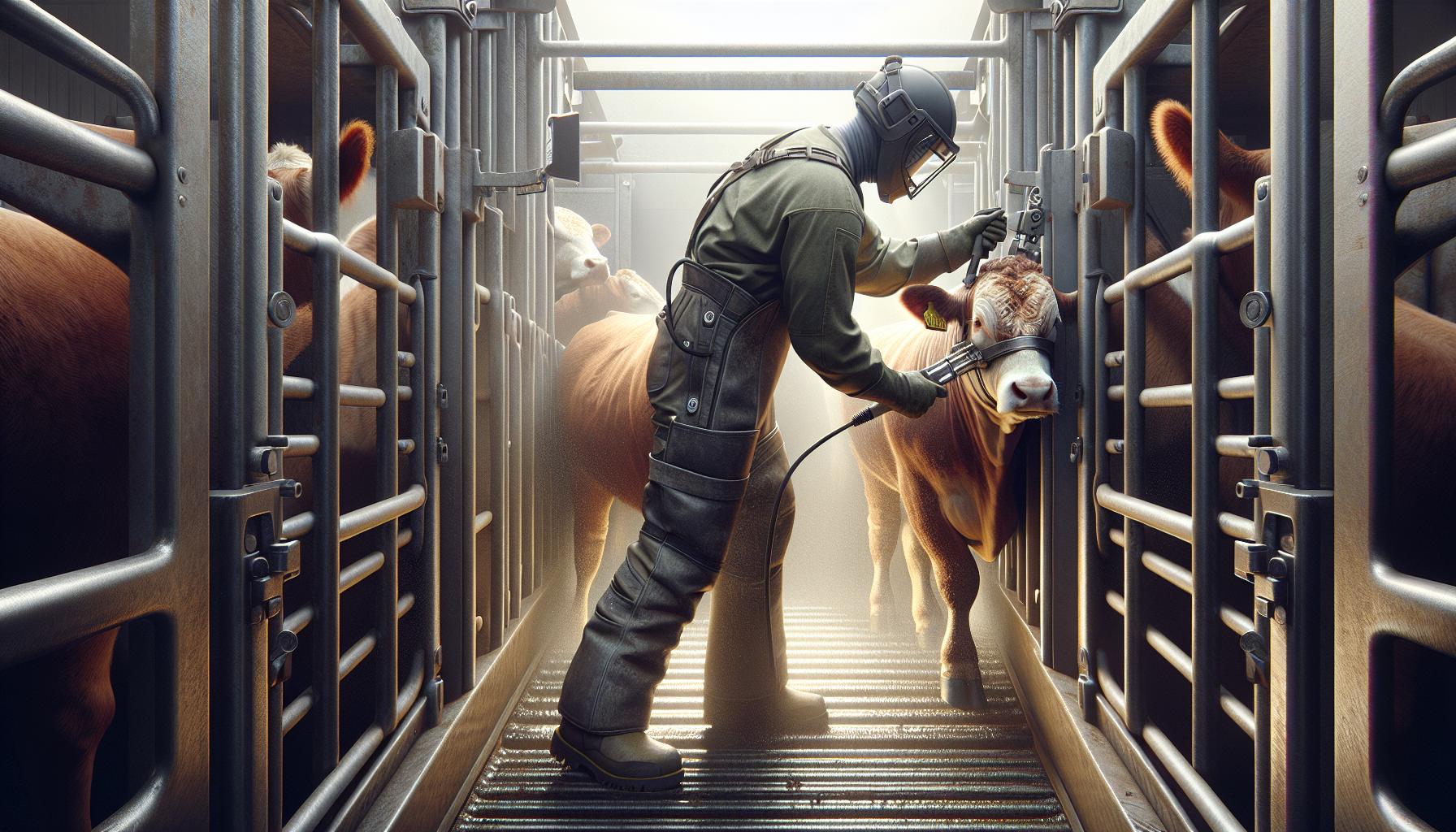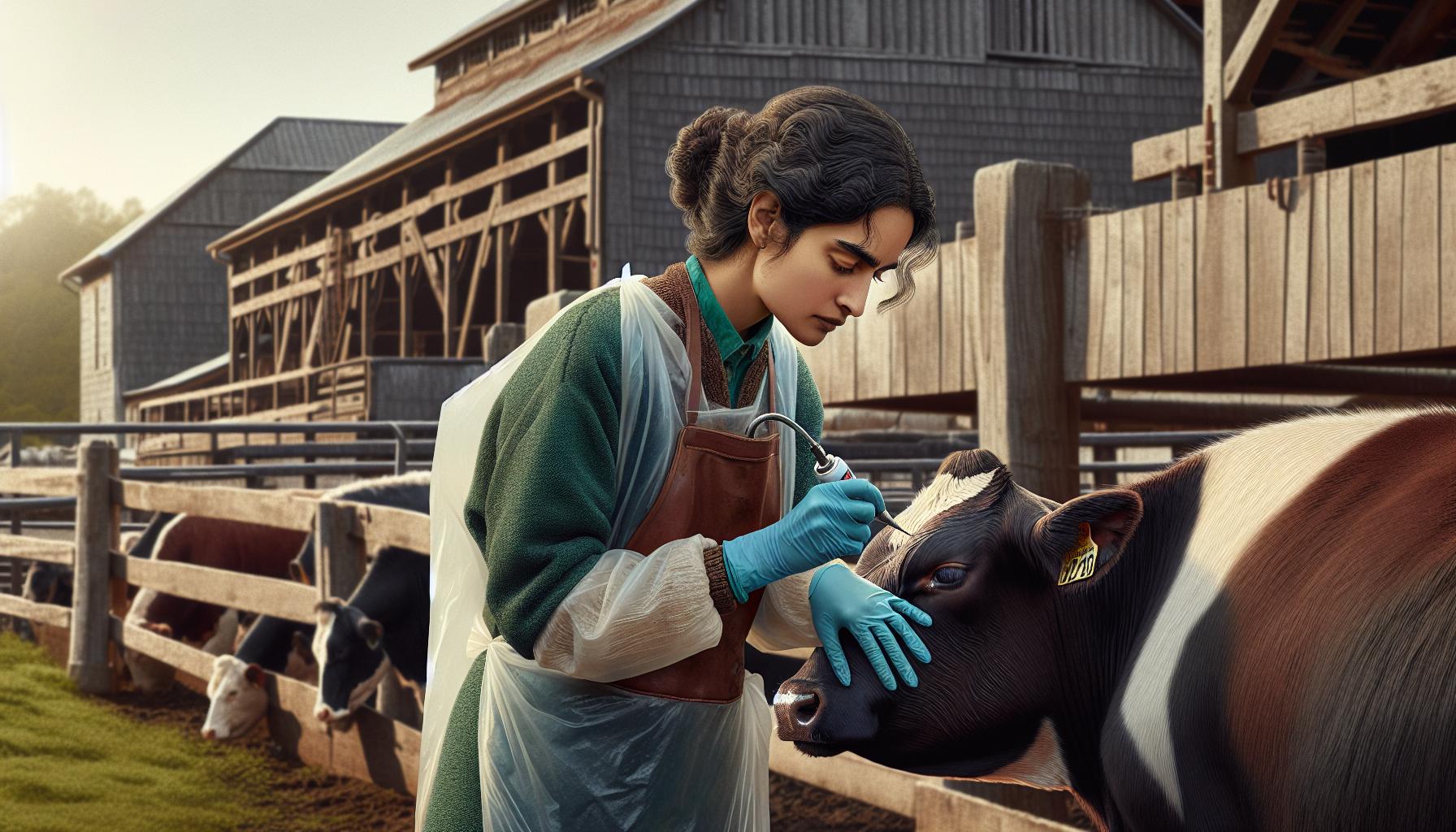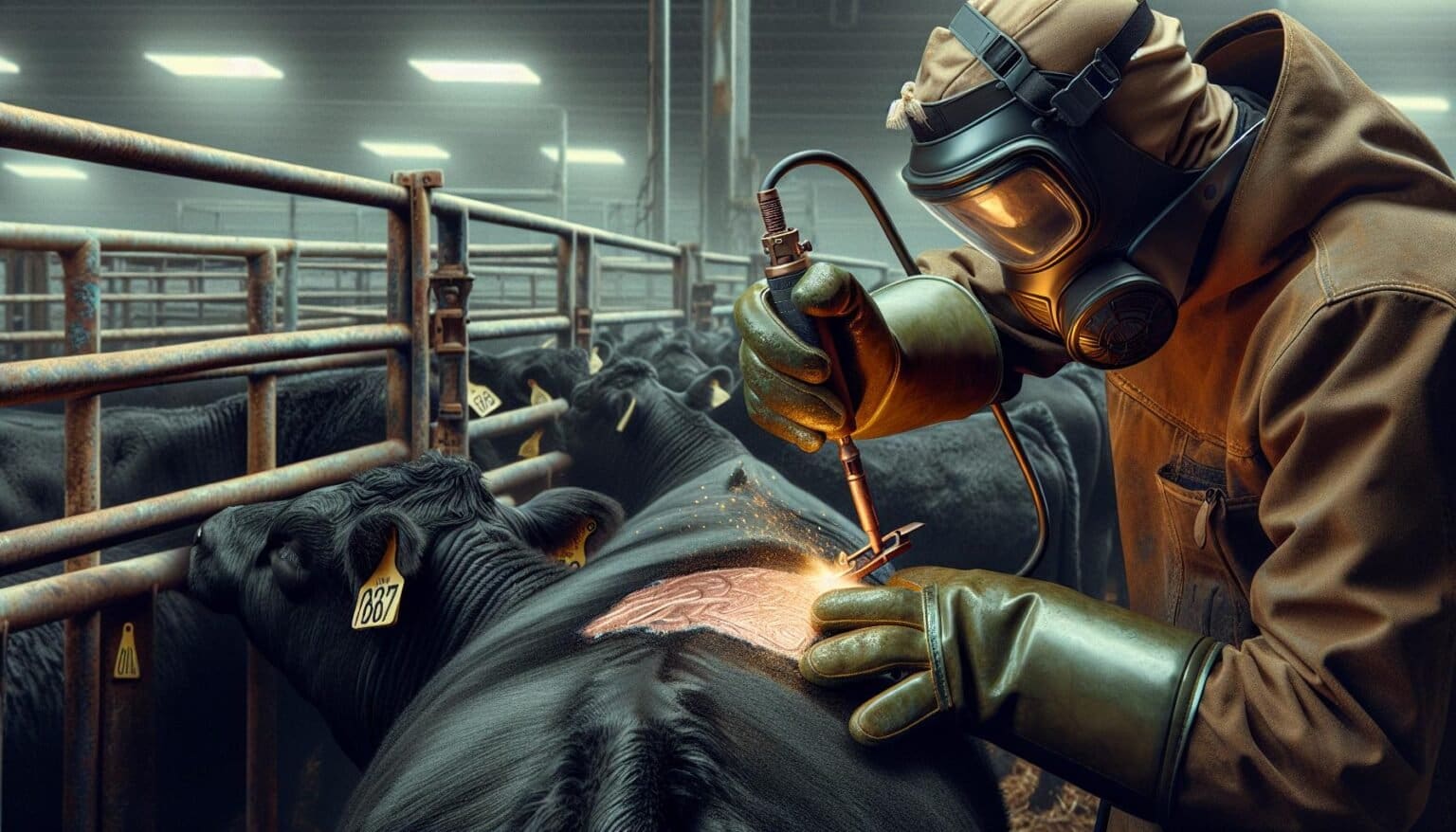Freeze branding cattle stands as one of the most effective and humane methods of permanent livestock identification. This innovative technique uses extreme cold to alter hair follicles creating distinct white marks that last throughout the animal’s lifetime while causing minimal discomfort.
Freeze branding involves pressing super-cooled copper branding irons against a shaved portion of the animal’s hide for 20-40 seconds. This process destroys the pigment-producing cells causing white hair to grow in its place creating a highly visible permanent mark.
Ranchers and livestock managers worldwide have embraced this modern identification method for its clear advantages over traditional hot branding. The resulting marks remain legible year-round and the process typically causes less stress to the animals than conventional branding techniques.
“1. Prepare branding equipment
Freeze branding cattle requires specific tools and materials for successful identification marks. Brass or copper irons serve as the primary branding implements, featuring custom-etched designs for distinct markings. The cooling process demands either liquid nitrogen (-344°F) or a dry ice-alcohol mixture (-112°F) to achieve the necessary temperature.
Essential safety equipment includes:
- Insulated gloves for handling super-cooled materials
- Protective goggles to shield eyes
- Heavy-duty clothing to prevent cold exposure
- Sturdy boots for stable footing
Required tools for branding preparation:
- Small animal clippers for hair removal
- Squeeze chute for animal restraint
- Cleaning supplies for equipment maintenance
- Storage containers for cooling agents
| Cooling Agent | Temperature | Application Time |
|---|---|---|
| Liquid Nitrogen | -344°F | 20-25 seconds |
| Dry Ice & Alcohol | -112°F | 35-40 seconds |
The branding irons remain immersed in the cooling solution for 20 minutes before use. Each iron requires thorough cleaning between applications to maintain marking quality.
2. Heat brand to proper temperature

Freeze branding irons require extreme cooling rather than heating. The copper or brass irons must achieve a temperature of -344°F (-209°C) for effective brand application. Two primary cooling methods exist:
Liquid Nitrogen Method
- Place branding irons in liquid nitrogen container
- Submerge irons completely for 10-15 minutes
- Maintain constant liquid nitrogen level
- Watch for rapid bubbling to slow before use
- Keep extras cooling while working
- Mix crushed dry ice with denatured alcohol
- Create a slurry-like consistency
- Cool irons for 20 minutes minimum
- Monitor temperature with thermometer
- Add dry ice as needed to maintain cold
| Cooling Method | Temperature | Cooling Time |
|---|---|---|
| Liquid Nitrogen | -344°F (-209°C) | 10-15 minutes |
| Dry Ice-Alcohol | -110°F (-79°C) | 20+ minutes |
The branding irons must maintain consistent temperature throughout the branding process. Remove one iron at a time while keeping others submerged in the cooling solution. Replace each iron immediately after use to ensure proper cooling for subsequent applications.
3. Restrain animal safely

Proper restraint during freeze branding requires a secure cattle working facility equipped with a squeeze chute. Position the animal inside the chute with the tail bar engaged to prevent backward movement. The animal’s stance must remain square to create precise brand impressions.
Essential safety equipment includes:
- Heavy-duty protective gloves
- Durable clothing
- Secure footwear
- Proper restraining equipment
The squeeze chute functions as the primary control mechanism, limiting the animal’s movement during the branding process. Apply consistent pressure through the chute’s sides to keep the animal steady without causing distress. The handler’s position remains outside the chute’s kick zone while maintaining clear access to the branding area.
Key restraint steps:
- Load animal into working facility
- Guide into squeeze chute
- Engage side panels
- Secure tail bar
- Check animal’s stance
- Adjust pressure as needed
The handler maintains control through proper positioning while keeping safety protocols in mind. A properly restrained animal ensures clean brand placement with minimal stress.
4. Apply brand quickly

Applying a freeze brand requires precise timing for optimal effectiveness. Press the chilled iron firmly against the prepared skin surface for 25 seconds on dark-haired cattle or 40 seconds on light-haired cattle. The iron makes constant contact with the skin to ensure even distribution of cold temperature.
Key application steps:
- Remove the iron from cooling solution immediately before use
- Place iron perpendicular to the skin surface
- Apply steady pressure without rocking or shifting
- Maintain consistent timing based on hair color
- Return iron to cooling solution after each use
The branding site transitions through 3 distinct phases during application:
| Phase | Appearance | Duration |
|---|---|---|
| Initial | Indented ice crystal formation | 1-2 seconds |
| Middle | Frozen solid white area | 10-15 seconds |
| Final | Thawed pink skin | After removal |
Monitor the animal’s movement during application to prevent smeared or incomplete brands. The freeze branding process creates a permanent white hair mark when the iron achieves proper skin contact time at the correct temperature.
5. Release and monitor healing”
The freeze-branded area progresses through distinctive healing stages after iron removal. A clear frost ring appears immediately after releasing the animal from the chute. The branded area transforms into a raised welt within 24 hours followed by slight swelling that subsides in 3-4 days.
Monitor the branding site daily for the first week to detect:
- Normal skin flaking
- White hair emergence (30-90 days)
- Even brand coverage
- Signs of infection
| Healing Timeline | Observable Changes |
|---|---|
| 0-24 hours | Frost ring to raised welt |
| 2-4 days | Swelling reduction |
| 7-10 days | Skin flaking begins |
| 30-90 days | White hair growth |
The healing process completes when the branded area grows white hair in the shape of the brand design. A properly applied freeze brand develops clear edges with uniform white hair growth across the entire branded surface. Brands that appear uneven or incomplete after 90 days indicate inconsistent iron contact during application.



